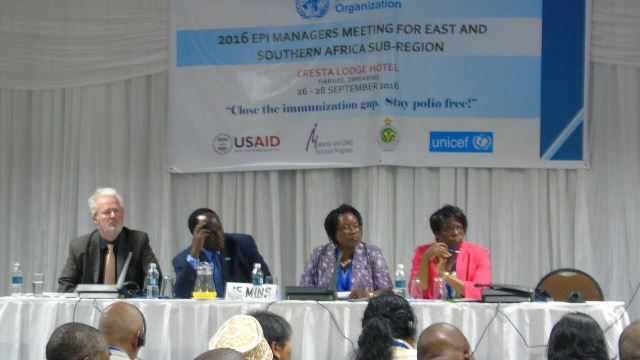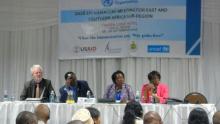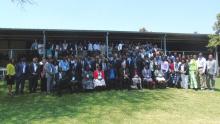Immunization officers urged to strengthen efforts to reach every child with vaccines and other health services
 Harare, 26 September 2016 – The World Health Organization has called for renewed efforts to reach every child in the African Region with vaccines and other health services.
Harare, 26 September 2016 – The World Health Organization has called for renewed efforts to reach every child in the African Region with vaccines and other health services.
The call came at a meeting held in Harare, Zimbabwe for immunization officers from the East and Southern African sub-Region (ESA). Speaking at the event, Dr Felicitas Zawaira, Director of Family and Reproductive Health of the WHO Regional Office for Africa, said: “Immunization is one of the key interventions that contribute to averting a large proportion of preventable deaths and we need to prioritize the attainment of universal immunization coverage by 2020 in East and Southern Africa.”
She noted that according to the 2015 UN report, the WHO Africa Region continued to report the highest number of under-five deaths rates. Of grave concern to the region is the large number of unvaccinated children – who make up a large portion of the one-in-five children not accessing the required vaccines.
Dr Zawaira urged the participants to establish ways of working with other ministries such as the Ministry of Defense and Military, Ministry of Education, Ministry of Communications, Ministry of Interior and others.
With technical and financial support from immunization partners, African countries have made significant progress in the following areas:
- Reduction of the under-five mortality in sub-Saharan Africa by 58% from [---% in 1990 to ---%2015]; great strides in the introduction of new vaccines such as pneumococcal conjugate vaccine (PCV), rotavirus vaccine, human papilloma virus (HPV) vaccine, and MenAfrivac® - the vaccine against Meningitis A.
- Successful switch of all 47 countries of the Region from use of the trivalent oral polio vaccine (tOPV) to the bivalent oral polio vaccine (bOPV).
The recent reported outbreak of three wild polio virus (type 1) cases in Nigeria, and the yellow fever outbreak in Angola and the Democratic Republic of Congo calls for renewed momentum in to tackle vaccine-preventable diseases.
The host of the meeting, Dr David Okello, World Health Organization Representative to Zimbabwe, stressed the importance of a multisectoral approach and integrated health services in order to reach all the children with lifesaving child survival interventions. He drew attention to the growing pockets of unvaccinated children in the ESA sub-region and called for improved public awareness on the benefits of immunization. “We need to communicate to communities that unvaccinated children present a serious health risk to the rest of the population,” he said.
In his remarks, Mr. Peter de Vries, UNICEF Zimbabwe’s Education Chief urged the participants to use the opportunity of the meeting to learn from each other to reach all children with lifesaving interventions. “The Expanded Program on Immunization (EPI) is not immune to socio-economic factors, diminishing donor support and vaccine hesitancy or objections, and it is important for countries to take financial and technical lead in the steps towards addressing these problems to improve immunization coverage,” he said.
The participants for the 2016 ESA EPI Managers’ Meeting are drawn from Ministries of Health, WHO and UNICEF, GAVI and other immunization partners.
______________________________________________
For more information, please contact:
Brazzaville – Collins Boakye-Agyemang, boakyeagyemangc [at] who.int (boakyeagyemangc[at]who[dot]int), Tel. +47 24 139 420
Loza Mesfin Tesfaye, Communications Officer, Tesfayel [at] who.int (Tesfayel[at]who[dot]int) Tel: +47 24 139779
Harare – Dr. Fussum Daniel, WHO, East and Southern Africa, danielf [at] who.int (danielf[at]who[dot]int), Tel. +263 772556629/632
Zorodzai Machekanyanga, WHO, East and Southern Africa, machekanyangaz [at] who.int (machekanyangaz[at]who[dot]int), Tel. +263 772511610




